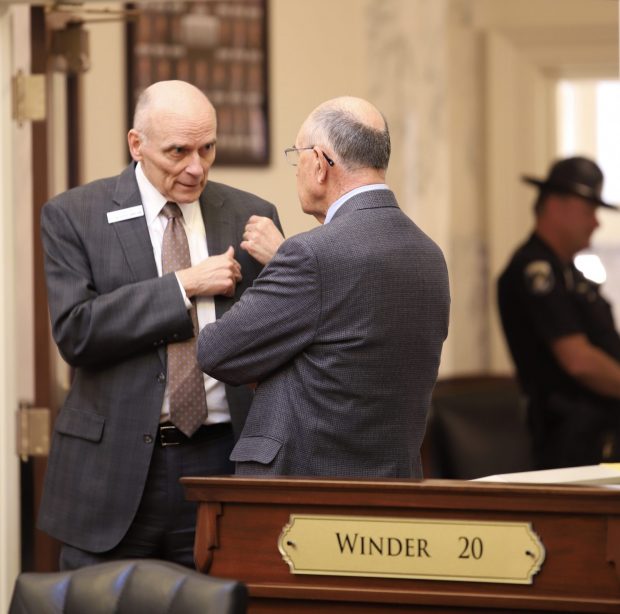
The 2024 legislative session finally hit its final day Wednesday — after 94 days.
Both houses adjourned just before 3 p.m. Wednesday, ending a session dominated by education topics.
In case you missed anything over the past three months, here’s a recap of all things education.
Facilities funding
A $2 billion plan to fund school facilities over the next decade is now in motion. Each school district will get a share of $1 billion, divided based on attendance, and the state will boost annual contributions to funds that help districts pay off bonds and levies. Altogether, House Bill 521 represents $1.5 billion in new state spending on school facilities.
This session’s blockbuster education spending — and tax cut — bill sailed through the House in February before slowing down on the other side of the capitol. Confusion swirled around an obscure provision in the bill that seeks to deter districts from switching to four-day school weeks. Some lawmakers questioned whether the money will do much good for small districts that need tens of millions, not just millions, to build new schools. Others raised concerns that the hodgepodge legislation could be unconstitutional — the state Constitution bars bills that embraced multiple subjects. The bill ultimately cleared the House and Senate on comfortable votes, and Gov. Brad Little, who co-authored HB 521, quietly signed it.
The facilities funding ‘trailer’
It didn’t take long for lawmakers to complain about the far-reaching, omnibus nature of a bill that passed overwhelmingly. And it didn’t take long for them to work on fixes. A followup to HB 521 — known as a “trailer” bill — makes a host of changes. It tweaks the four-day schools language; provides a funding patch for the Oneida School District, which stands to lose state funding under HB 521; and allows the Senate to confirm future executive directors of the State Board of Education. It also fixes a glitch from last year’s big property tax relief law, ensuring charter schools receive facilities money totaling $400 per student. Little signed the bill into law Monday.
Tuition tax credits
This session’s major “school choice” proposal — a $50 million tax credit and grant program for private school tuition — failed to overcome a House committee. Dozens of supporters attended an emotional hearing on the bill, and national groups continued to spend heavily lobbying for tuition assistance. But bipartisan opposition closed the latest chapter in Idaho’s debate over school choice, a loose heading of proposals directing taxpayer funds to private education.
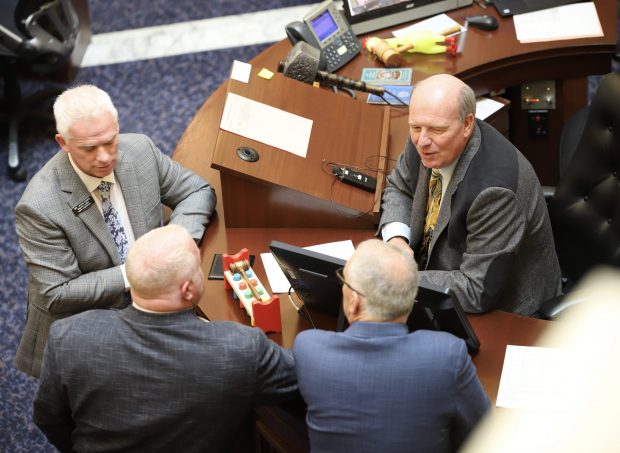
Idaho Launch
It wasn’t easy, but the Legislature did wind up funding the first year of Launch. That’s good news for nearly 9,000 high school seniors. It means they will qualify for grants of up to $8,000, which they can use for college or job training.
“I am certain Launch will be looked upon by future generations, employers, high schoolers and legislators as the cornerstone in our long-term success as a state, a visionary project that took courage to support,” Gov. Brad Little said in a letter to House Speaker Mike Moyle Monday, announcing he had signed the Launch budget into law.
As the $70.8 million budget bill worked its way through the houses, lawmakers looked for ways to tweak the program — especially the way the state defines in-demand careers that qualify for Launch grants.
University of Phoenix
Both houses came out against the University of Idaho’s $685 million acquisition bid. The House passed a resolution that sought to slow the deal, or kill it. The Senate voted down a separate bill, which would have restructured the purchase. While U of I and Phoenix officials say they are still exploring their options, the deal appears to be in serious jeopardy.
In a related move, the Legislature passed a law requiring agencies to give advance notice to legislators and the public, before agreeing to a purchase of more than $25 million.
Libraries
A successful library bill emerged at the end of the session, after a strung out period of negotiating and debating that killed one other proposal. The approved legislation sets up a process for public school and library patrons to challenge books they consider “harmful” to minors. If library officials don’t remove or relocate the material to an adults-only section within 60 days, they can face a $250 statutory fine along with potential civil damages.
After vetoing a similar bill last session, Little signed the latest version Wednesday. The governor said it addressed most of his concerns with last year’s bill: It lowered the potential fine, gave libraries time to address book challenges and tightened the definition of “harmful to minors.”
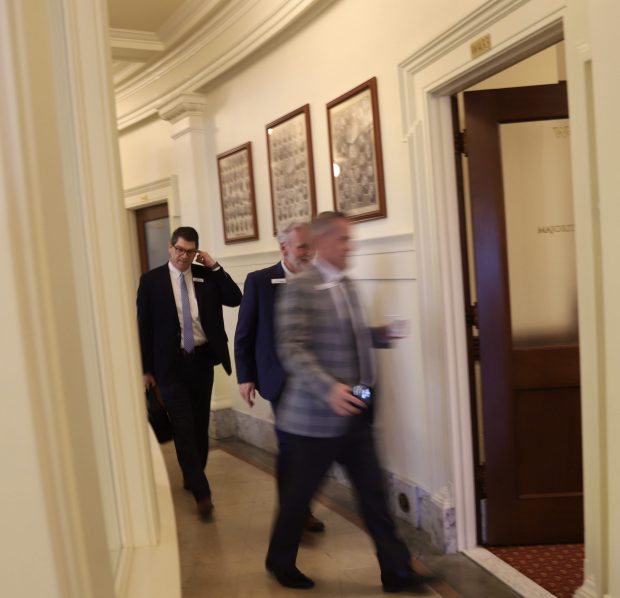
Guns in schools
It was a double-barreled process. First, the House passed a bill to allow school employees with an enhanced concealed carry permit to bring guns to schools. Education groups and school resource officers vehemently opposed this bill. Then, the Senate came back with a bill with additional training requirements; this eased some concerns from educators and SROs, but Second Amendment advocates opposed it. This bill failed in Senate committee, leaving the status quo in place; districts and charters can still adopt local policies allowing guns in school.
Pronouns
After fierce debate and a pair of near-party line votes, Little quietly signed a “pronouns” bill into law Monday morning. Teachers and school staff would not be required to use a pronoun that doesn’t align with a person’s sex at birth. Schools, meanwhile, could be sued if they compel the use of pronouns that aren’t aligned with sex at birth.
Flags
A bill prohibiting schools from displaying flags “that represent a political viewpoint” passed the Senate but died in the House Education Committee. Public testimony centered on Pride flags and displays. Committee members said the bill was unclear, and said it would invite a lawsuit.
Summer lunches
Idaho could have joined a newly permanent U.S. Department of Agriculture program that offers low-income children free lunches over the summer. The federal government would have covered all of the lunches — at a cost of $16.3 million — but Senate Republicans declined to pay the $545,300 in administrative costs to set up the program.
ADA funding gap
State superintendent Debbie Critchfield accomplished one of her primary goals of the session: filling an K-12 appropriation gap left by the reversion to a funding formula based on average daily attendance. Lawmakers took up Critchfield’s request late in the session but it was ultimately uncontroversial — as least in the public eye. There was little resistance to sending $145 million to schools through a series of tranches, including discretionary money directly to districts along with boosts for bond and levy aid and a workforce training program.
Outcomes-based funding
It was another one of Critchfield’s highest priorities: She wanted to move $40 million of K-12 spending into an outcomes-based pilot. She wanted to tie the money to performance in fifth- through eighth-grade math, and college and career readiness. The bill passed the House. Without discussion, the Senate Education Committee shot it down.
School funding formula
Critchfield also tried to take an incremental first step at modernizing Idaho’s byzantine and aging funding formula. The proposal would have shifted some of the state’s discretionary K-12 money into a “per-student” model — a step toward a weighted model that provides added funding to serve students with special needs. The idea got a hearing in a House committee, but went no further.
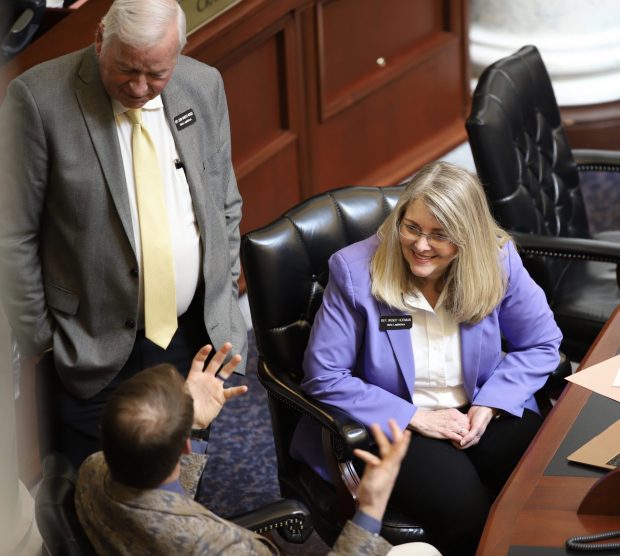
Teacher pay
The Legislature took no action to boost teacher pay beyond continuing to fund the career ladder. Next school year, the career ladder hikes starting teacher pay from $41,118 to $41,500, while state funding for teacher pay tops out at $63,000, up from $58,613. The career ladder represents baseline state funding for teacher pay, but salaries are set locally.
Campus diversity
A new law will prohibit campus diversity statements, in the hiring or admissions process. That’s not entirely new; a State Board of Education policy already forbids the state’s colleges and universities from asking a job applicant to submit a diversity statement.
Higher education spending
With some reluctance, legislators passed a followup higher ed budget that covers staff pay raises, and provides discretionary money for everything from salaries to cybersecurity courses. The floor debates didn’t really dig into items that are actually in the budget. Instead, hardline conservatives sought to cut the budget to target DEI programs that don’t even receive state funding.
Empowering Parents
Families will get to apply for $30 million in microgrants, which cover out-of-pocket education costs such as laptops, home internet or learning materials. Lawmakers also made a few changes to the popular program: For example, parents will be able to use their grants for student fees, such as sports pay-to-play fees and FFA fees. Empowering Parents survived a rocky start; in January, Little’s budget team suggested putting one of his pet programs on the chopping block, in the interest of balancing the books.
Advanced Opportunities
High school students will be able to spend more Advanced Opportunities money, and in more ways. Public and charter school students will now get a $4,625 line of credit — a $500 increase, and enough to cover the cost of an associate’s degree. For nonpublic school students, the cap increases from $750 to $2,500. Students will also be able to spend up to $1,000 on a career-technical course, up from $500.
Charter schools
The Legislature passed a wide-ranging overhaul of charter school law — supported by charter advocates, the state’s Public Charter School Commission, Little and Critchfield. Among other things, the law will allow new schools to operate under a six-year charter, up from five years; extend charter renewals to 12 years; allow for three-year “pilot” charters; and allow charters to accept private contributions.
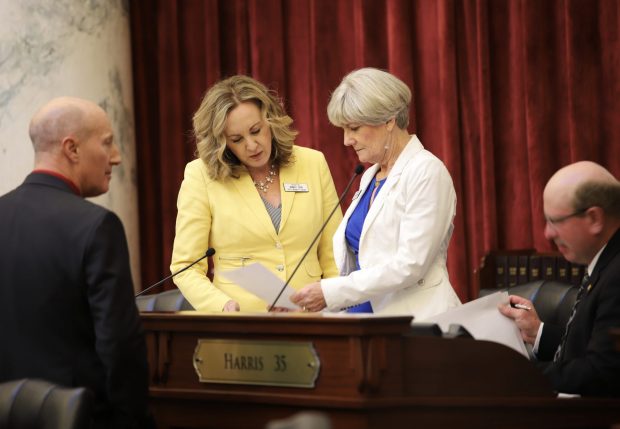
Bond issue supermajority
It was a long shot from the start. Rep. Rod Furniss, R-Rigby, led a push to ease the two-thirds “supermajority” threshold to pass a bond issue. The constitutional amendment, which itself needed two-thirds support in both houses, never got a vote on the House floor. But it did clear one hurdle; the House Education Committee passed it easily.
Blaine Amendment
Another proposed constitutional amendment didn’t even get that far. An attempt to repeal the Blaine Amendment — which prohibits the use of public money for religious purposes, including schools — stalled out in the House State Affairs Committee.
State Board appointments
Traditionally, governors have chosen State Board members from around the state — but that has been a matter of custom, not law. Under a new state law, the governor will be required to pick board members from seven different geographic regions.
Immunizations
One immunization bill became law — giving students ages 18 and older the right to opt out of vaccinations. Two other bills passed the House on party-line votes before stalling in the Senate: a bill to make the state’s immunization registry an opt-in program, rather than an opt-out program; and a bill that would have required more schools to send parents immunization opt-out information.
Mask mandates
The House passed a bill that would have banned school districts and other public agencies from issuing mask mandates. It never got a hearing in the Senate.
